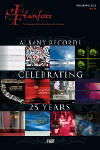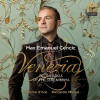Texte paru dans: / Appeared in:
Virgin Classics |
|
|
Reviewer: Bertil
van Boer What is it with the baroque early music movement? It seems that we are now inundated with a plethora of excellent male singers who have tackled, and triumphed over, the often awe-inspiring castrato opera aria repertory. Now we have countertenor Max Emanuel Cencic competing with a selection of arias drawn from the theaters of the Serenissima, that is, Venice, for which important composers such as Antonio Vivaldi, Antonio Caldara, Francesco Gasparini, and Tomaso Albinoni wrote some of their most challenging works. And, as is usual with such discs, the music of lesser lights, Giuseppe Selitto (1700-1777), Neapolitan opera great Giovanni Porta, and Geminiano Giacomelli (1692-1740), is also included as excerpts from some of their more interesting operas. Make no mistake, this is a disc that is meant primarily to show off the talent of Cencic, another potential bright star in the countertenor firmament. The excerpts range from the murmuring “Mormorando quelle fronde,” with its pizzicato strings and waiving violins (and voice, too, of course) to the Vivaldi fuorore aria “Mi vuoi tradit,” with its extensive coloratura, insistent bass accompaniment, and typical string accompaniment that swirls melodically in the ritornellos. I would like to say that there is something special about each one, but apart from obvious trademarks, Vivaldi, and the rest sound remarkably alike. There is fast and furious (or plaintive and soulful) string ritornello, followed by vocal pyrotechnics or languid lyrical lines, with a B section that brings only a slight contrast, and an explosive return. Given that these are display vehicles of similar quality and structure, it is simply impossible to get a handle (or should I say Handel?) on the operas themselves. Vivaldi we know, and Caldara is an up and coming name, but the rest will not have their operas resuscitated by the disc, no matter how inventive a Selitto or Giacomelli is. That is not to disparage the quality of the performances, which are very high indeed. Cencic moves with ease through the pitfalls of the music, singing with excellent interpretation and consummate skill. He is perfectly capable of any of the emotions, from sorrow to rage, and his performance of the often tortuous roulades is natural, almost as if these are minor toss off pieces. The accompaniment of Riccardo Minasi’s Pomo d’oro is equally excellent, with swift or sedate tempos and phrasing that complement Cencic’s vocal line. The strings melt into the accompaniment framework easily, with no discernible glitches. It is, as with many Italian ensembles of early music, simply a fine rendition of the way this music ought to be performed, and as such is a model of excellence. I highly recommend this disc for anyone who wishes a glimpse into the vibrant and active world of Venetian opera of the first half of the 18th century. Those enjoying the “castrato” revival will also find that Cencic has produced a disc that is the equal of any of his colleagues, and as such has enhanced our understanding of the male soprano sound we once thought so rare and strange. This is the way 18th-century opera seria needs to sound. Now, if only we could get the resources to persuade these artists that, in order to truly appreciate the glory of the opera of that time, entire works need to be recorded. I for one would be happy to hear one with Cencic in the lead. | |
|
|
|
|
|
|
|
Cliquez l'un ou l'autre
bouton pour découvrir bien d'autres critiques de CD |
|




